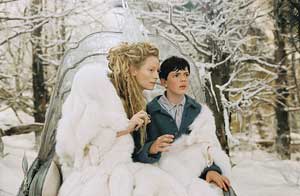 Skandar Keynes plays one of my favorite little bastards from literature, Edmund Pevensie, who sells out his family to the evil White Witch for some Turkish Delight. Now, if that was hash I would totally understand, but it turns out it’s some kind of English candy (English candy just automatically means "bad").
Skandar Keynes plays one of my favorite little bastards from literature, Edmund Pevensie, who sells out his family to the evil White Witch for some Turkish Delight. Now, if that was hash I would totally understand, but it turns out it’s some kind of English candy (English candy just automatically means "bad").
The White Witch of Narnia, who has imprisoned the land in a hundred years of winter (and no Christmas!), was supposed to be Nicole Kidman at one point, from what I understand. If that’s true, director Andrew Adamson lucked out that she couldn’t do the film, as Tilda Swinton is fantastic in the role.
In real life Tilda’s hair is white, or a very very platinum blonde, and she kind of looks like David Bowie. Skandar is much less of a little bastard.
Q: White Witch vs Lord Voldemort. Who wins?
Swinton: Can I ask you a question? Are you talking about a character from Lord of the Rings? Seriously, because I haven’t seen Lord of the Rings.
Q: Harry Potter.
Swinton: I haven’t seen that either. Sorry. [to Skandar] But you say, since you’ve seen Harry Potter.
Keynes: I’ve seen Harry Potter. White Witch all the way! But I haven’t seen Voldemort alive yet.
Swinton: That’s a fantastic idea. To do a film where they fight.
Q: Skandar, Edmund could be seen as a real jerk in this movie. He betrays his brothers and sisters. How do you make him likable at the end?
Keynes: I don’t think you’re supposed to like him at first. You’re not supposed to sympathize with him, anyway. It’s when he gets redeemed that you like him. It was easy with Andrew’s direction and the script.
Q: Is it easy to understand redemption at such a young age?
Keynes: I think so.
Swinton: There are many things Skandar Keynes doesn’t understand.
Anybody who has been mean to their sister – as any right-thinking sibling has – would understand the need for redemption.
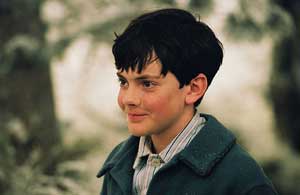 Q: Have you read the Narnia books?
Q: Have you read the Narnia books?
Swinton: I haven’t seen any films, I haven’t read any books. No, I haven’t read the books.
Q: But I read that you read them to your daughter.
Swinton: I read them to my son and daughter when Andrew had asked me to do it. Because I wanted to see if it worked. It did!
Q: Your kids are OK with their mom being the baddie?
Swinton: They’re not interested in seeing the film, by the way. They’re the only two tickets in the world, I think, that Disney is not going to sell. But I am thrilled about that.
Q: They never saw you in costume?
Swinton: No, they never saw me in costume.
Q: After working so realistically in character roles, how do you approach bringing reality to a character as over the top as this one?
Swinton: She’s not a character in that she’s not human. It’s a free pass into all sorts of nonsense that doesn’t add up. It occurred to me that there was a stereotype of evil out there that had never frightened me, certainly not as a child, which was a sort of stomping, shouting, hot variety. What I really wanted to look at was a thing that I think really frightens children, which is a kind of coldness. And a kind of unpredictability. The idea that somebody is not remotely emotional – even when she shouts at him, she shouts because she think it will help. So I don’t know, it’s a big dress and as much tension as possible with these children.
The idea is that what children particularly find really frightening is being unaffectably dominated. There’s no way any pleading – she’s totally unmovable. There’s nothing you can say. That’s frightening. Somebody losing their temper or shouting means you’re affecting them. Children love knowing they’re getting to you. You can’t get to her. She’s not even there.
Q: How did the icicle tiara come about?
Swinton: I’m not a believer in metal crowns and I thought it would be nice to see her crown. She is Narnia; she’s this evil spirit and she needs some kind of semi-human form, so she just gives herself the shape and pulls in the side of a frozen waterfall for a dress and a bit of snow for a fur, and this ice crown. The idea is that as her power fades, the ice crown goes too. I just love that. I thought it was something to watch.
Q: What did you actually have on your head?
Swinton: A big old wig.
Q: One of the scenes I was really taken with was the Stone Table. The mood is so thick, so heavy. I am curious – when you’re on that set, how many creatures are actually there and how many are added later?
Swinton: I don’t know exactly the statistics, but it was a full on rock concert of the Iron Maiden variety, and it was packed. A lot of them were [there]. It was pretty packed.
Q: That must have created an interesting feeling on set. You’re actually playing to the minotaurs.
Swinton: Yeah. We’re bringing out an album later this year. [gesturing to Keynes] We’re bringing out lounge music, the two of us. Sleigh Time. Winter Wonderland.
Q: You guys have a ton of scenes together. What was your working relationship like? Tilda, did you keep Skandar in line?
Swinton: Rather. That’s where we’re going – into the Truth Zone.
No, it was very silly most of the time, but very silly.
Q: Skandar, what did you learn from Tilda?
Keynes: When I first arrived on the set I was shoving food in my mouth and running around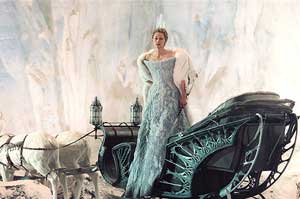 the set. I had just come from school and here were all these free soft drinks. And Tilda came on and she –
the set. I had just come from school and here were all these free soft drinks. And Tilda came on and she –
Swinton: I’ve taught him not to use the brand name of the soft drink.
Keynes: So then I saw Tilda come on, and she was cool and laid back and relaxed. I realized that maybe I should calm down a bit.
Swinton: I made a lazy clone.
Q: Skandar, what was the battle scene like for you?
Keynes: That was cool. I wasn’t really in most of the battle scene, you’d have to ask William about that, but the parts I were in were fun. Edmund’s true turning point is when he goes to stop the Witch.
Q: Do you enjoy playing bad characters?
Swinton: I’m trying to think of what bad characters I’ve played. You’re going to say Constantine.
Q: The Beach.
Swinton: Well, The Beach is different.
Keynes: What’s The Beach?
Swinton: You’re too young, man. You’re too young to see all my films.
But that’s a human, a fanatical human. I think that I personally have a problem with doubtlessness. I think doubtlessness is a problem. I really like testing that. The character in The Beach had that fanatical doubtlessness and becomes unstuck by it. The Angel Gabriel in Constantine, even though the Angel Gabriel is the righteous one and is good and golden and warm and smiling but the road to hell is paved with good intentions, and ends up torching the place. As we see people doing all the time in the name of righteousness. This one is the big one, as it’s the epitome of all evil. It’s not even human. It’s not even really in human shape. And she’s cold. She really wants to dominate.
But the short answer is yeah, it’s interesting to feel the edge of that.
Q: How do you choose projects?
Swinton: The people. It’s always the people. I was spoiled so early on when I first started making films with Derek Jarman and I worked with the same team for nine years on seven different films and I learned early that it can be that good. It can be that much fun and it can be that rewarding and that a conversation with a filmmaker is what it’s all about. And it’s borne out. The fact is that in the independent world it may take you five years to get a film off the ground, so you better like hanging out with these people. And then you’re going to have to do this for probably another ten years to get the film to reach it’s audience. That’s what I’m in it for, a feeling of friendship and comradeship.
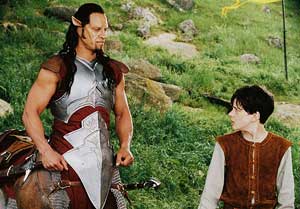 Q: Can you tell right away when you speak with a director if it’s going to be a good experience?
Q: Can you tell right away when you speak with a director if it’s going to be a good experience?
Swinton: Yeah, if there’s a kind of excitement in the filmmaker. Very often, I have to say, it’s in a big-time filmmaker. The joke is that in the last year I have made two big studio films, but both of them have been with first time filmmakers. Francis Lawrence with Constantine and Andrew Adamson with this. They’re the most highly funded first time filmmakers in history, probably, but still first time filmmakers filled with an enthusiasm you cannot buy, and a first timer’s mind filled with ‘Let’s give it a go.’ That’s really a wonderful thing to get caught up in. I love working with people who just want to go on that kind of adventure.
Q: Skandar, can you talk about the audition process?
Keynes: Out of the four children I was the last one to be found. I did five auditions and at one point they tried to cram all the auditions in, so I did three in a week. Then I found out I got the part.
Q: Is there a character from literature or history that you would like to play?
Keynes: Maybe some assassin or something would be cool.
Swinton: Maybe a remake of Zoolander.
Keynes: Yeah, if they do a remake of Zoolander I could do that.
Q: So for both of you guys this is your first action figure movie. Unless I’m wrong, Tilda, and they did that playset for The War Zone.
Swinton: I think it’s still on sale.
I love that idea. It’s so sick. Video games would be next. War Zone video games. [to Keynes] And that’s another one you can’t see, so don’t even ask.
Q: But this is your first action figure?
Swinton: Apparently, but I haven’t seen it. Do you get it in cereal packets?
Q: McDonalds.
Swinton: You get it at McDonalds? Excellent. How wise they were not to tell us that before we signed the contract.
In McDonalds what’s the product? Is it an Edmundburger? What do they put on the food, what’s the white stuff?
Q: Tilda, I spoke to you earlier this year for Thumbsucker, a movie you helped produce. You said you were doing movies like this to build your Rolodex for future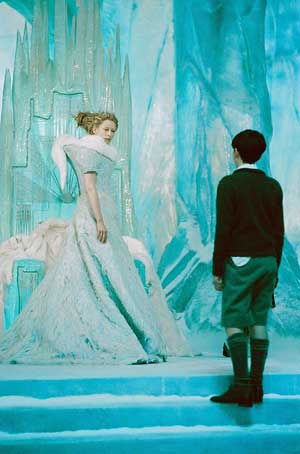 indie projects. Are there more small movies like that on the horizon for you?
indie projects. Are there more small movies like that on the horizon for you?
Swinton: Yeah. And I hope Disney will help. [laughs] I love the idea that it’s possible that a few people might go look for the films of Derek Jarman as a result of this film. Or that we might be able to get David Mackenzie, who made Young Adam – [to Keynes] which is another one you can’t see either!
Keynes: Can I see any of your films?
Swinton: David Mackenzie and I may be able to get our film about Nico started next year. Or that there’s a project I’m working on for the next few years that might be easier to get done in the next few months.
Q: Speaking of Skandar not being able to see your films, this introduces you to a younger audience.
Keynes: I’ve seen Vanilla Sky.
Swinton: How did you see that, man? You’re too young.
Keynes: It was on TV. I’m not too young for that!
Swinton: That young audience is, I hope, going to be backing away from me for the rest of their lives. Most people say they make movies so their children can see it, but my kids don’t want to see this, so that won’t work.
Q: Why don’t they want to see it?
Swinton: They’re not in the loop of all this. They don’t watch television. They live up a tree. We keep them in a box. I want to say that they’ve got better things to do with their time and I look forward to Walt Disney publicity coming down on my head, but they have. They’ll see it when they’re 21.
They’re not that interested, and it took me away from them for a bit. They call it Lionel Ritchie’s Wardrobe anyway.
Q: I would go see that.
Swinton: I would too. Lionel Ritchie’s Wardrobe.
Q: He keeps it on the ceiling, I think.
What’s Michael Clayton?
Swinton: Michael Clayton is a film that Tony Gilroy is writing and directing and George Clooney’s company is making in January. It’s the same team that made Syriana and Traffic.
Q: What are you playing and what’s it about?
Swinton: It’s about… what’s the sound bite for that one? It’s about a sort of corporate corruption, whistle-blower story. I’m playing a corporately corrupt lawyer.
Q: You’re a bad guy again.
Swinton: I’m a human bad guy. Yeah, deeply flawed.
Q: Skandar, have they talked to you about coming back for Prince Caspian?
Keynes: If the film does well… they probably have, but I can’t remember.